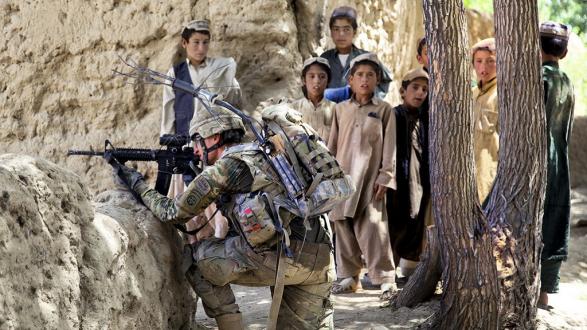The project to Strategically Protect Soft Networks (SPSN) is an effort by Pacific Council member and retired U.S. Army Colonel Steve Miska to create a public-private enterprise that engages the U.S. policy community and infuses creativity into the development of policy measures that effectively protect soft networks. The Pacific Council partnered with SPSN to engage other Council members in a policy development process that sought to ensure our allies’ faith in U.S. missions abroad, such as by hosting a discussion at PolicyWest featuring a former Iraqi interpreter and an American who hosted an Afghan family fleeing violence abroad.
The following is an executive summary of a report featuring SPSN's research on and recommendations for protecting soft networks.
____________________
As a result of U.S. involvement in various counterinsurgency operations, soft networks have come under direct threat from hostile forces. Yet, current U.S. security policies for these critical assets remain ad-hoc and largely ineffective. Failure to protect soft networks damages the United States’ ability to accomplish missions abroad as local confidence and relations with host-nations are shaken.
"Soft networks" refers to indigenous partners in diplomatic, military, intelligence, and law enforcement operations, and often include interpreters, local business contractors, politicians, teachers, intellectuals, religious leaders, and others deemed vital to U.S. national interests, as well as their families. These local national partners are integral to achieve United States national security interests and provide invaluable support to American diplomatic and military efforts in conflict zones—often in spite of tremendous danger from adversaries.
This analysis reviews best practices for local workers in non-military sectors, cybersecurity threats to soft networks, and the current gaps in government contracting policy regarding local-national partners. This white paper acts as a primer for policymakers aiming to understand the strategic implications of ineffective soft network protection, examines alternate protection practices, and provides a feasible policy framework to create policies that protect critical U.S. military and diplomatic networks.
Key Findings
- The use of threat assessments to determine circumstances surrounding local partners provides valuable insight into regional circumstances, allowing practitioners to tailor security measures to particular situations.
- Soft network existence in a legal grey area that neither classifies them as civilians nor combatants denies them potential legal protections.
- U.S. forces must understand foreign cybersecurity and communications situations and tailor security policies to enhance local-national partner security, particularly with regard to identity protection.
- Subcontracting local-national partners often results in a detrimental loss of oversight and responsibility regarding soft network protection.
Key Recommendations
- Assign Responsibility: Task the National Security Council with acting as the chief arbiter on soft network policy decisions and implement greater oversight by the Defense Contracting Management Agency regarding contracts between American companies and local-national partners.
- Develop Policy and Doctrine: Create methodology that U.S. forces can use to insulate local-national partners from threats. Additionally, address the ambiguous legal classification of soft networks to provide better legal protections.
- Implement Education and Training: U.S. military and diplomatic personnel and soft networks receive additional training to enhance identity protection and cybersecurity practices. This includes war-gaming and risk assessments.
- Expand the Special Immigrant Visa (SIV): The SIV program should be expanded to include programs for all U.S. diplomatic and military partners at risk due to their association with the United States. The SIV should be a policy of last resort, not the only policy available to practitioners.
Next Steps
The SPSN team will pursue further research in these areas:
- Documentation and categorization of attacks against local partners
- Legal research focusing on integrating legal protection into soft network insulation policy
- Research on contracting policies that jeopardize the safety of soft networks
- Research emphasizing the development of cybersecurity practices that insulate partners
- Continued development of partnerships with organizations to aid research and advocacy
Furthermore, we recommend two options in the event the NSC does not provide oversight to the policy development process:
- Include soft network insulation in the Stabilization Assistance Review (SAR)
- If SAR is not feasible, initiate a SAR-like program with other departments
Read the full report here.
____________________
Steve Miska is a Pacific Council member and founder of SLC Consulting. He recently launched a project to Strategically Protect Soft Networks (SPSN), in conjunction with the Pacific Council, to research and recommend policies to protect U.S. allies in conflict zones.
Rebecca Asch is a lead researcher at the project to Strategically Protect Soft Networks.
Sam Romano is a lead researcher at the project to Strategically Protect Soft Networks.
Jure Erlic is a junior fellow at the project to Strategically Protect Soft Networks.
The views and opinions expressed here are those of the authors and do not necessarily reflect the official policy or position of the Pacific Council.




